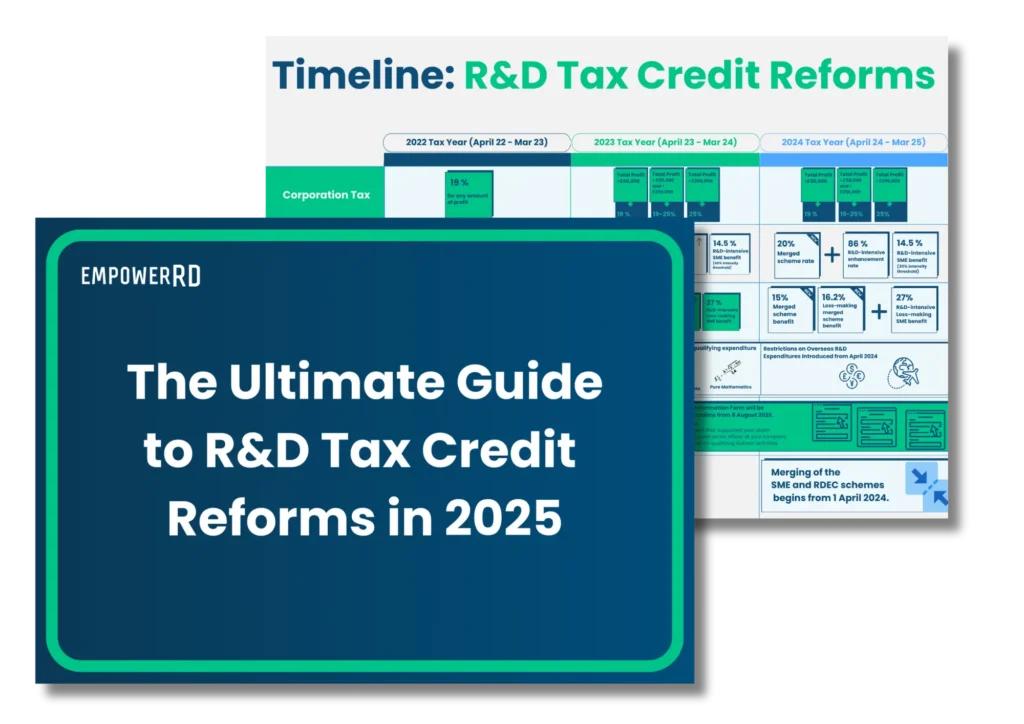This is the second in our series of articles to help you get the most out of your R&D tax credit claims in 2025. Today, we’re talking about the importance of building a culture of compliance, especially for scaling SMEs in the face of HMRC’s increased scrutiny.
With HMRC’s enquiry rate jumping from 1% to 20% of claims last year, compliance is no longer just a tick-box exercise – it’s critical. A culture of compliance ensures a more efficient claims process, faster payments and less enquiry risk. And if an enquiry does happen, having good records means you can respond quickly and effectively, giving you the best opportunity to defend your claim.
Insights from the EmpowerRD Webinar
This article is based on our EmpowerRD webinar, “How to Be a Good R&D Claimant,” where industry experts Dave Sellick (Owner of Sidgrove Accounting), Alex Riseley (Financial Controller at Streetbees), and Dr. Matthew Rix (R&D Tax Consultant at EmpowerRD) share their expertise on how to ensure your R&D claims are compliant, well-supported, and risk-free.
Watch this webinar clip to learn more about how to create a culture of compliance for R&D tax claims!
Want to learn more? Watch the full webinar for expert advice on how to be the best R&D tax claimant you can be, ensuring a compliant and optimised claim.
Why a culture of compliance
Compliance isn’t just about meeting HMRC’s rules – it’s about building a system that makes claims easier, faster and more robust.
As Dave Sellick says:
“It all comes down to communication. And then again, prioritising accordingly based on where the clients are. Sometimes R&D might not be the top of their list. But having the right infrastructure in place is key to avoiding issues down the line.”
By tracking R&D activities and embedding compliance into everyday operations, businesses can protect their claims and get tax relief without added complexity.
How to build and maintain a culture of compliance
While HMRC enquiries can’t be avoided – due to HMRC’s random enquiry programme – you can reduce risks by making your claim more robust. Here’s how:
1. Keep good records
Compliance starts with documentation: track staff hours, project milestones, software costs and other qualifying R&D expenses. Use tools like Jira, Trello or Xero to automate tracking and reduce admin.
2. Educate your team
For compliance to work, everyone needs to know what R&D is. As Dr. Matthew Rix says, “Make sure your whole team knows what qualifies for R&D and how to document it.” Regular training sessions and internal workshops help finance and technical teams get their reporting in line.
3. Use the right tools to simplify processes
Technology can make compliance faster and more reliable. R&D tax credit platforms like EmpowerRD’s can integrate with Xero and track time allocations so you have a clear audit trail.
4. Accept enquiries may happen but plan for it
Even with good compliance, HMRC will still do random checks. However, a well-supported claim gives you confidence and ensures the enquiry process is a lot shorter.
As Dr Matthew Rix says:
“HMRC need to see evidence that the work is solving a technological uncertainty. Technical narratives and financial documentation are key in defending enquiries.”
By following these steps, you reduce risks, speed up claims and comply.
Why you need experts to stay compliant
As HMRC increases scrutiny, businesses can’t afford to navigate R&D tax credits alone. The risk of misclassifying costs, missing documentation, or failing to meet evolving requirements is too high.
As Dave Sellick, an accountant who advises startups, explains:
“I have always advocated for working with a consultant on the R&D side. Again, I’m not talking necessarily about curating a culture internally, but it naturally does if you engage with a consultant because it creates another layer of productivity to the company.”
Many accountants offer R&D tax relief as a service, but specialist expertise matters.
“HMRC will build a level of assurance when they’re looking at claims that have been created with a credible R&D consultancy. That’s just the way it is.”
A strong compliance culture, backed by expert guidance, helps businesses submit accurate claims faster while reducing risk if an enquiry arises.
How R&D tax specialists help businesses stay compliant
Embedding compliance into business processes
An R&D tax specialist helps companies build structured, audit-ready claims.
As Alex Riseley highlights:
“If you don’t have a system in place, things fall through the cracks, and you’re exposed when it comes to submitting claims.”
Minimising errors in claims
A common mistake is misclassifying costs. An expert prevents this and ensures claims align with HMRC criteria.
As Dave Sellick explains:
“Having a platform like EmpowerRD’s is incredibly helpful—it speeds up financial data processing and ensures costs are correctly categorised.”
Faster, more efficient claims processing
Instead of scrambling at the last minute, businesses can structure claims properly from the start.
As Alex Riseley notes:
“Each year, we try to start earlier and get an estimated figure (from EmpowerRD) as soon as possible. That makes a big difference when it comes to financial planning.”
Expert support during HMRC enquiries
Even with a strong compliance culture, HMRC may still ask questions. Having an expert ensures a quick, accurate response.
As Alex Riseley points out:
“If there’s ever an enquiry, we have a team that knows exactly how to handle it, which gives us confidence.”
Rather than struggling to defend a claim alone, businesses benefit from expert advisors who know how HMRC evaluates claims and what documentation is required.
Final thought: Compliance is the secret to R&D tax success
As HMRC cracks down, businesses must be proactive with compliance. A system in place, backed by expert advice means you can:
- Get R&D tax credits faster
- Reduce the risk of costly mistakes
- Be ready for HMRC enquiries
As Dave Sellick says:
“The risk is so huge that… just telling founders at that early stage is important because the people that you care about the most—those putting cash into your bank account, investing—they care a huge amount about this. If this process goes wrong, that’s the end of their investment.”
A culture of compliance is not just about protecting your claim – it’s about long-term sustainability so you can innovate with confidence.If you’d like to talk to an R&D specialist about your next claim, get in touch with EmpowerRD today.












